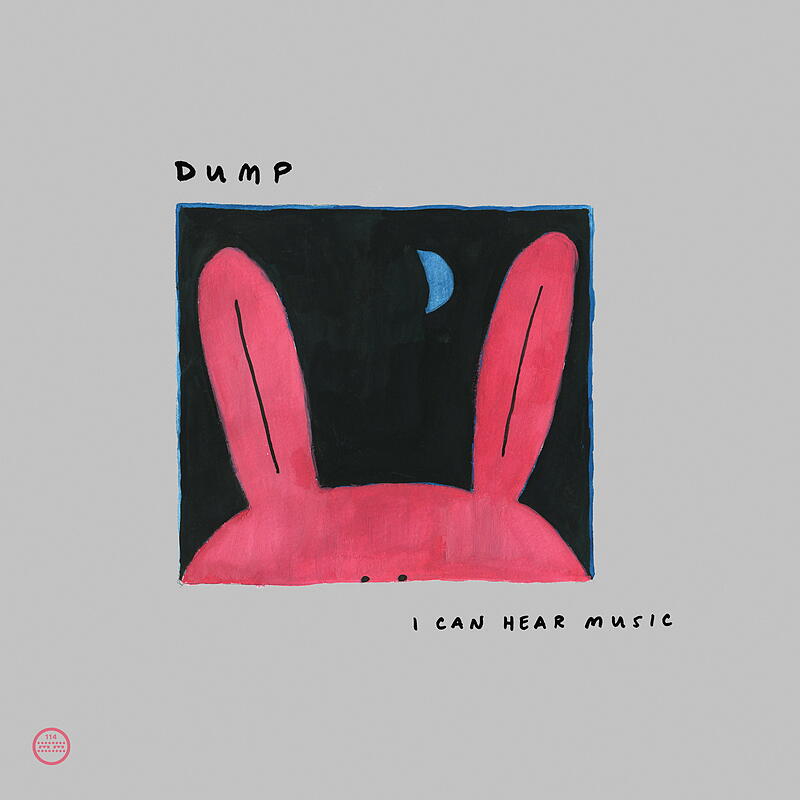Some people complain that friends today are made with mouse-clicks. As if it was more personal in the 90s. James McNew for example became a good friend of mine in 1994. Never mind I hadn’t even talked to the guy - hell, he covered Jandek AND the Silver Apples. We had so much in common!
James McNew is a fan boy. If the name-drop-list ranging from Albert Ayler to Young Marble Giants included with his first 45 didnt tell you that, the blazing in his eyes when a name like the Shaggs was uttered, certainly did. Yet McNew is not obsessed with obscurity but with music.
When his debut album »Superpowerless« appeared in 1993, the choice of covers ranged from Sun Ra to that tune Audrey Hepburn serenaded to millions of movie watchers, »Moon River«. While McNews high, sexy voice might be »superpowerless«, his ears certainly are not. It’s been the intimate sound of a 4-track-recorder that tied these different angles of his eclectic taste together.
Yes, Dump was part of the Lo-Fi-generation. Nothing makes that clearer than the bonus tracks to his follow-up album »I Can Hear Music«. Recorded during the infamous dutch Fast Forward Festival in 1994 in – naturally – a living room, it contains all that was great about the few short moons of tape-hiss: colaborations triggered not even remotely by virtuosity (had Chris Knox ever played trumpet before that afternoon?); cardboard boxes as bass-drums; the victory of enthusiasm over perfection (have Half Japanese been covered with more emphaty?); Barbara Manning.
The only thing that wasnt quite right about these first two Dump albums, was the format. But as justice doesn’t know age, it’s good to see these CDs finally being pressed on vinyl! They deserve it. After all, James is a friend. Did I mention he’s playing bass in Yo La Tengo?
– Gregor Kessler, Hamburg, December 2012
Liner Notes: The year was 1994. Americans thrilled to the latest episodes of »Friends« and »Frasier,« assholes smoked cigars in public with impunity, the New York Knicks lost to the Houston Rockets in the NBA finals, and Lo-Fi music was sweeping the nation!
Largely due to the astronomical success of Dump's debut album, Superpowerless, the music world shifted dramatically away from the grandeur of Grunge and the pomp and circumstance of Alternative Rock. Following Dump's lead, bands had turned away from the bloated, inaccessible recording studio system and embraced 4-track cassette recording as the industry standard. In his memorable article for Rockpool, Steven Hawking described this new musical phenomenon as »Lo-Fi.« The landmarks of the era still stand tall: The Red Hot Chili Peppers' classic, That's My Wiener; Madonna's haunting tribute to Jandek, You Painted Your Teeth; Evan Dando's introspective Where Are My Keys?; Blues Traveller's 8-LP psychedelic song-cycle Tangerine Shithead. All were recorded one track at a time in (very nice, I must say!) living rooms and bedrooms on 4-track cassette machines. Critics gushed (»Wuuuhh« - D. Fricke) and philosophized (»Bweee« - A. Powers) on this musical revolution. Hollywood, always with its finger on the pulse, quickly followed suit with the Lo-Fi box-office smash »Overdubbing Jennifer,« earning Steven Baldwin his first Academy Award (tm). Recording studios went out of business, and once-fatcat record producers were forced to burn their consoles to keep warm, huddled out in the alleys behind the buildings that used to be their studios, and were now cigar bars. Tough luck, jerks!
Brinkman Records opened offices in New York, Rio de Janeiro, and Monte Carlo. Joost Visser's likeness was immortalized on a postage stamp in Mexico. Lou Barlow singlehandedly won the 1994 Winter Olympics. The Allen Callaci/ Janet Jackson Love Dabblings LP went double-platinum on the same day his brother Dennis (D, CA) married both Cindy Crawford and Julia Roberts at the same time - wow, what an anniversary!
The world celebrated and ushered in the New Year (who could forget Dick Clark introducing that generation-defining performance by Luxurious Bags in Times Square??), giddy with anticipation of things to come. Finally, in March of 1995, Brinkman Worldwide Entertainment Group And Oil Company released »I Can Hear Music«. And the rest is history! That's how I remember it.
– James McNew, Brooklyn, NY, Summer 2012
